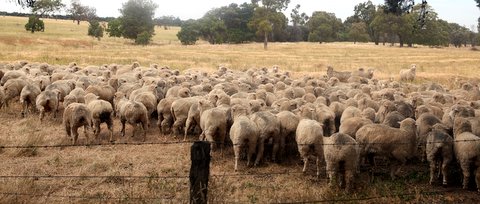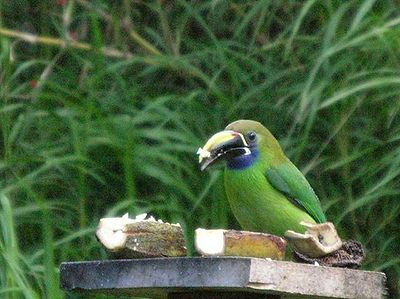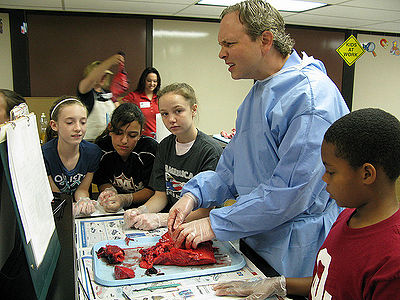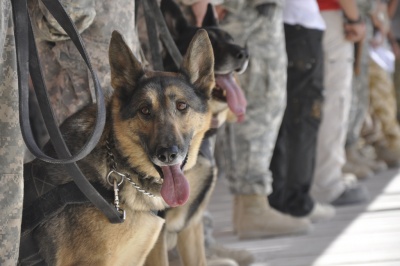
The link to Australia on the page regarding the QLD floods, states that the Live Export Trade is regulated and that there are qualified and experienced animal handlers, including an Australian veterinarian and stockmen, on board the ships. Yes, one vet for 30,000 or more sheep per voyage. The transport and handling of the sheep on the way to the docks, has been exposed as cruel and careless, with footage taken of the ‘experienced’ animal handlers throwing sheep from the top of 2 storey trucks, onto the ground. This has been aired on prime time current affairs programs nationwide. Once aboard the ship, enroute to their destination, many of the sheep die of suffocation, starvation, thirst, disease and many are crushed to death. Many export ships have caught fire or sunk, and the animals on board have die a terrible death by being burnt alive, or drowning.
However, the millions of Australian sheep who have died on grueling voyages en route to Middle East may well have been the lucky ones. The peak season for live animals to be exported to countries with no animal welfare laws is the Eid al Adha – the Festival of Sacrifice. Those who survive the voyage will routinely endure brutal handling and horrific slaughter that would be rightly illegal in Australia. Please call on your MP to end this cruel trade. The Festival of Sacrifice in the Middle East marks one of the darkest times on the animal welfare calendar. Tragically, hundreds of thousands of exported Australian animals are amongst the millions of animals who are sacrificed during religious celebrations at the end of the Hajj.
In the same way that Christmas has become the peak time of animal suffering in the West with vast numbers of factory farmed animals slaughtered for Christmas celebrations, the Festival of Sacrifice is the worst time of animal suffering throughout the Middle East. Islamic teachings speak to the importance of humane treatment of animals, but the sheer numbers of animals bought and sacrificed inevitably leads to cruelty on a massive scale as the welfare of individual animals is forgotten.
In 2010 Animals Australia investigators on location in the Middle East again documented sheep being routinely bound, shoved into car boots or loaded onto the back of utes, before suffering a terrifying death on the morning of the Eid; their throats are cut whilst fully conscious, often by inexperienced slaughtermen in private premises or by exhausted abattoir workers who are working at ten times their normal capacity.
Past evidence obtained by Animals Australia investigators of the brutal treatment of Australian sheep in Egypt during this festival had forced the Federal government to ban the live sheep trade to Egypt in 2008. Despite similar graphic evidence being documented in other Middle Eastern countries, the Federal government continues to allow animals to be exported to the region.
Kuwait is an oil rich nation situated on the Arabian Gulf. It is also the major destination for Australian sheep in the Middle East. Some 22 million Australian sheep have been exported to Kuwait over the past 20 years. In early 2004 and again in 2006 Animals Australia investigators visited Kuwait and brought the brutal treatment of sheep and cattle in Kuwait at the Shuwaikh abattoir and the Al Rai livestock market to the attention of the Federal government and live export industry.
Animals Australia has implored both the Rudd government and LiveCorp/Meat & Livestock Australia (MLA) to at the very least reduce the risks posed to exported Australian animals by ensuring that they were not on-sold to individual buyers — an outcome that they could legitimately achieve through requirements in export permits and exporter/importer agreements. Neither the government nor the live export industry was willing to take this obvious measure to reduce suffering, even though both admitted that religious festivals such as the Eid al Adha (or ‘Festival of Sacrifice’) where large numbers of animals are sold to individual buyers presented the greatest risks to Australian animals.
Last month Animals Australia’s Lyn White returned to Kuwait for the Festival of Sacrifice and visited once again the Kuwaiti livestock market and abattoir that had presented such grave animal welfare concerns in the past.
“In the Shuwaikh abattoir trussed and terrified Australian sheep were being dragged up the ramp into the slaughterhouse right in front of a MLA sign saying “don’t drag” animals. Nothing had changed in the dreadful cattle slaughter area at the abattoir either.”
Australia has also exported over 23,000 dairy cattle and 17,000 beef cattle to Kuwait since 2003.
“The streets of the Al Rai market on the morning of the Eid turned into a mass slaughter area for animals. Australian sheep were being purchased, bound with wire and shoved into car boots whilst others were being dragged terrified on their stomachs towards filthy slaughter areas on the side of roads where they waited amongst the dead and dying to have their throats cut. Within 30 minutes of the slaughter starting the streets were running with blood.
“The treatment of two young dairy bulls was so horrendous that it was almost soul destroying to witness. One was killed on the side of the road, and the other in a carpentry workshop. Both were brutally forced to the ground where they struggled, terrified as they were trussed with rope over a period of many minutes until tightly bound, they had their throats cut by inexperienced slaughterers resulting in long, painful deaths.
“One of the most disturbing aspects of this investigation was to clearly witness again that local people are happy for ‘tourists’ to watch and film their cruel treatment of animals. Conveying that I am an Australian makes me even more popular since we supply them with animals each year. Tragically Australia’s willingness to export animals to the region continues to reinforce local beliefs that their treatment of animals is acceptable.
“Whilst the majority of Australian animals will be slaughtered in the Middle East whilst fully conscious all year around — and animals are available to be sold to individual buyers each day — MLA and LiveCorp know so clearly that animals are en-masse brutally treated during the Festival of Sacrifice yet they are still willing to send hundreds of thousands of animals to this Festival each year.”
Footage obtained by Animals Australia investigators in Bahrain in 2007 forced the Bahraini government to prohibit the transpiration of Australian animals in boots from the Bahrain feedlot for fear of losing their supply of animals. MLA/LiveCorp has lauded the success of their “in the Ute, not the boot” initiative.
“We also visited Qatar and Bahrain to observe the livestock markets. In Qatar — where MLA have also introduced their ‘in the ute, not the boot’ programme at the importer Al Mawashi feedlot — we observed terrified sheep being put in the back seats of cars of individual buyers.
“In Bahrain we watched MLA staff at the main feedlot ensuring sheep were not going into boots, but they seemed oblivious to the fact that small trucks were regularly leaving the feedlot with more animals that could be needed for individual purchasers. On following these trucks we saw that other selling markets had been established where Australian sheep were being sold into car boots. MLA had a cameraman at the feedlot filming the success of their education programme for a PR film. Their energy would have been better served identifying as we did that the problem was far from solved, but rather that it had been moved to other locations.
“Of additional concern is that this industry initiative is actively encouraging and facilitating animals to be purchased for home slaughter — where they are at greatest risk of ill-treatment.”
Animals Australia’s investigations in the Middle East have clearly revealed that animals will only be protected from cruelty when legislation is passed to prevent cruel treatment and practices. Current treatment is even contrary to Islamic teachings, yet widespread abuse still routinely occurs. Far from influencing change, Australia’s live export industry’s willingness to supply animals is contributing to and condoning animal cruelty.
A decision by Australia to not provide animals on animal welfare grounds will resonate through the region and assist the calls from the many caring Muslims throughout the Middle East for animal cruelty legislation to be passed.
www.liveexport-indefensible.com
www.stopliveexports.org
Related articles:



